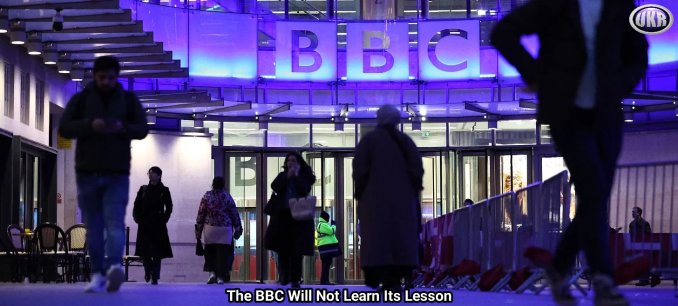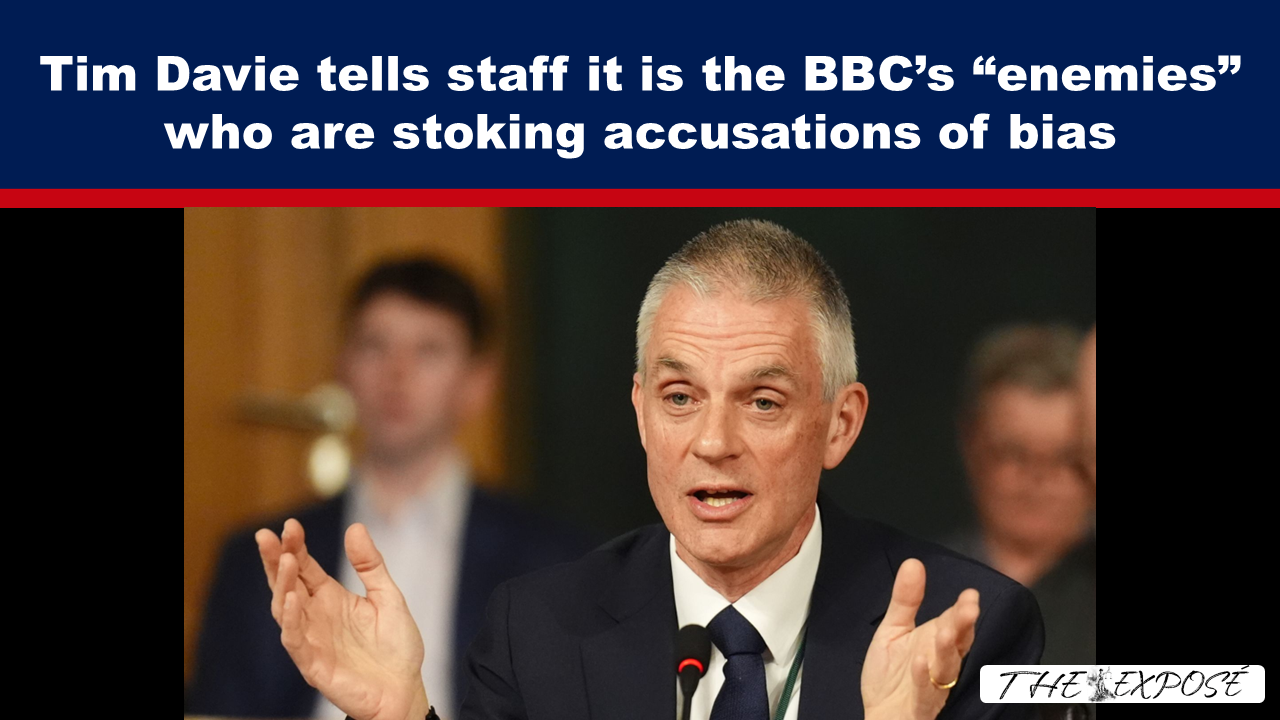
The BBC will not learn its lesson
Even with senior heads rolling, the state broadcaster remains unwilling to confront its deep-rooted institutional bias.
ANDREW DOYLE
The culture war has produced innumerable masters in the art of doubling down. It’s an intuitive strategy; every bluebottle knows that if at first you fail to break through the window pane, it’s best to just keep colliding into it in the certainty that you’ll eventually achieve your goal.
So it is with the BBC. Last week I wrote about the corporation’s myriad failures when it comes to fulfilling its duty of impartiality. The revelations that the editors of Panorama spliced together two clips of Donald Trump to give the false impression that he was directly inciting violence at the Capitol on 6 January 2021 has now resulted in the resignation of the Director General, Tim Davie, and the Head of News, Deborah Turness. Perhaps this is due to concern about international relations. More likely it is Trump’s threat of a $1 billion lawsuit.
But in their resignation statements, neither Davie nor Turness appeared willing or able to acknowledge the broader problem of institutional bias, evidenced most strongly in the BBC’s continual censorship of news stories that raise questions about the potential harm of gender identity ideology. Specifically, activists on the ‘LGBT desk’ have been empowered to ‘keep other perspectives off air’. The leaked internal dossier that brought about this current crisis outlines a range of failures, including ‘a constant drip-feed of one-sided stories… celebrating the trans experience without adequate balance or objectivity’. (For an exhaustive overview of examples, take a look at this thread.)
In spite of the overwhelming evidence of partisanship, this was how Davie addressed the matter in his resignation letter:
‘Like all public organisations, the BBC is not perfect, and we must always be open, transparent and accountable. While not being the only reason, the current debate around BBC News has understandably contributed to my decision. Overall the BBC is delivering well, but there have been some mistakes made and as director general I have to take ultimate responsibility.’
Turness was even more defiant:
‘In public life leaders need to be fully accountable, and that is why I am stepping down. While mistakes have been made, I want to be absolutely clear recent allegations that BBC News is institutionally biased are wrong.’
This from the corporation that issued guidelines to encourage its staff to add pronouns to emails as a ‘small, proactive step that we can all take to help create a more inclusive workplace’. This from the corporation that insisted that a London protest in the wake of the death of George Floyd was ‘largely peaceful’, even though the headline of the article itself conceded that 27 police officers had been injured. This from the corporation that instructed staff to take a day’s paid leave following the Black Lives Matter hysteria to ‘educate’ themselves on diversity, inclusion and Critical Race Theory. The reading list that was provided included texts on ‘Whiteness’, ‘The End of Policing’ and ‘The Urgency of Intersectionality’.
And in June 2020, the BBC committed to spending £100 million on improving diversity in its output, even though according to a survey by the Creative Diversity Network (of which all UK broadcasters are members), ‘those who identify as female, transgender, BAME and lesbian, gay or bisexual (LGB) are all represented at levels comparable with (or above) national population estimates’. In other words, the BBC was spending a significant amount of licence-payers’ money to resolve a problem that had not existed for many years.
So why are so many still denying the institutional ideological bias in the face of all the evidence? Quite simply, it is because in our age of ‘post truth’ and ‘alternative facts’, narrative is prioritised over reality. This is why even a ruling from the Supreme Court on the meaning of ‘sex’ in the Equality Act is roundly ignored by charities, corporations and even the Scottish government. When any organisation becomes infected with ideology, the creed must take priority over all other factors.
If further evidence of bias were needed, this week the BBC’s international editor Jeremy Bowen confessed that he was factually wrong to report that the Al-Ahli hospital in Gaza had been destroyed by Israeli forces. In fact, the explosion had occurred in the adjacent car park. This was his version of an apology:
‘Oh yeah, well I got that wrong because I was looking at the pictures and what I could see was a square that appeared to be flaming on all sides and there was, sort of, a void in the middle. I think it was a picture taken from a drone. So, you know, we have to piece together what we see and I thought, “It looks like the whole building has gone”. That was my conclusion from looking at the pictures and I was wrong on that, but I don’t feel particularly bad about that. It was just the conclusion I drew.’
The bias against Israel in the BBC’s reporting is well documented. The BBC’s Arabic service has been forced to make 215 corrections and clarifications after misleading or inaccurate reporting in the past two years alone. So why such a casually dismissive response from Bowen?
He is not alone. Other BBC veterans are circling the wagons, determined to deny the reality of the dossier’s findings. Nick Robinson, presenter of BBC Radio 4’s Today programme, has implied that this is all some kind of coup. He has further pointed out that ‘there were no complaints received about the editing of Donald Trump’s speech’, as though shoddy journalism is acceptable so long as nobody notices. World affairs editor John Simpson likewise believes that there is ‘a political campaign by people who want to destroy the organisation’. But most of those who are criticising the BBC are doing so because they want it to maintain higher standards. It is not anti-BBC to criticise it for its failings; it’s precisely the opposite.
The resignation of two top dogs at the BBC will not save it. The activists who have been granted so much power to censor according to their belief-system are still in their roles. And those who failed to restrain them are doubling down on their delusion that there has been no systemic bias at all. Whoever succeeds Davie will need to learn from his predecessor’s mistakes, and insist that the obligation of impartiality applies as much to ideology as it does to party politics. If it cannot reckon with the activists in its ranks, the BBC has no future.
This article (The BBC will not learn its lesson) was created and published by Andrew Doyle and is republished here under “Fair Use”
See Related Article Below
Tim Davie tells staff it is the BBC’s “enemies” who are stoking accusations of bias
RHODA WILSON
Tim Davie, the outgoing BBC Director General, has publicly defended the corporation against its critics, accusing “enemies” of the BBC of weaponising criticism and attempting to undermine its reputation, following a scandal over the editing of a Donald Trump speech in a Panorama documentary.
The latest BBC controversy stems from a leaked memo by Michael Prescott, a former external adviser to the BBC’s editorial standards committee. US President Donald Trump has threatened a $1 billion lawsuit against the BBC, calling its journalists “corrupt” and accusing them of “doctoring” his speech.
The Telegraph, which broke the story of Prescott’s memo earlier this month, no longer appears in results for queries entered into search engines. We’re not sure when search engines began down-ranking The Telegraph (it seems to have happened in the last few months) or what the reason is, but the tactic of down-ranking sites or removing them altogether from search results, particularly by Google, will be familiar to those who follow outlets that speak against the establishment’s preferred narrative. It is one of the many mechanisms used to censor voices to maintain control of the narrative. The Exposé, for example, has been a victim of down-ranking for years; it is only in recent months that The Exposé has been “recognised” by and appears on internet search engines. The bottom line: If you want to find an article published by The Telegraph, you will need to go to their website and search for it there.
Yesterday, The Telegraph published an article about Tim Davie’s address to BBC staff following his resignation. Davie was the Director-General of the BBC from September 2020 until he resigned on Sunday due to the controversy about the editing of Mr. Trump’s speech.
In his address to staff, Davie stated that the BBC is “the very best of what I think we should be as a society” and expressed pride in the organisation’s work, despite acknowledging it had made “mistakes that have cost us.” He specifically blamed “enemies” of the corporation for stoking allegations of bias, arguing that the narrative surrounding the BBC should be controlled by the organisation itself, not its critics.
Read more: Tim Davie launches fightback against BBC’s ‘enemies’, The Telegraph, 11 November 2025
As one commentator on social media said, if Davie came down from his ivory tower for just a moment, he would realise that the BBC’s “enemies” are many. An additional 300,000 households have stopped paying the licence fee in the last year. Many of these will have stopped paying the licence fee in protest at the propaganda BBC peddles as “news” and the critical social justice being peddled in various forms through its channels. In the last year, the fee evasion rate has increased to 12.52%, meaning nearly one in eight of the estimated 28.6 million households in the UK are now not paying the licence fee. In other words, the BBC has millions of “enemies,” and that is just in the UK.
Further reading: Turn off the TV – Neuro-linguistic programming has been used against populations in many countries and the UK could be in the driver’s seat
What Davie has also failed to recognise is that the latest controversy is in a string of many, as Sky News Australia pointed out in a broadcast today.
Sky News host Rita Panahi and Douglas Murray discussed how “lost” the BBC is after their editing scandal of US President Donald Trump. This is not an “isolated” incident of institutional bias, Panahi said. “It’s not a simple misjudgement. The BBC’s institutional bias goes well beyond Donald Trump.”

This article (Tim Davie tells staff it is the BBC’s “enemies” who are stoking accusations of bias) was created and published by The Expose and is republished here under “Fair Use” with attribution to the author Rhoda Wilson






Leave a Reply